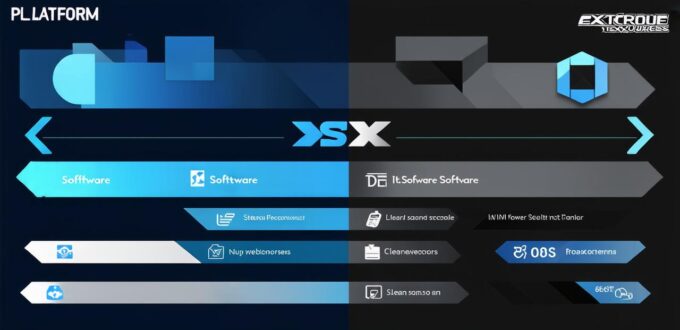As software developers, it’s essential to understand the difference between platforms and software to make informed decisions when building applications. In this article, we will explore the key differences between these two concepts and their roles in the tech industry.
1. Definition
Before diving into the differences between platforms and software, let’s first define each concept. A platform is a set of services, tools, and resources that enable developers to build and deploy applications on top of it. It provides an environment for developers to write code and publish their applications, making it easier for users to access and use them.
Software, on the other hand, refers to a program or application designed to perform specific tasks, such as word processing, graphic design, or gaming. It can be installed and run directly on a device or computer without needing any additional infrastructure.
2. Functionality
One of the main differences between platforms and software lies in their functionality. Platforms are designed to provide a framework for developers to build applications, while software is built to perform specific tasks.
For example, a platform like Facebook provides a set of services that enable developers to build social media applications. Developers can use these services to create custom features such as messaging, photo sharing, and gaming. On the other hand, a software application like Microsoft Word provides a set of tools for writing documents, creating spreadsheets, and formatting text.
3. Ownership and Control
Another key difference between platforms and software lies in ownership and control. Platforms are usually owned and controlled by companies or organizations, while software can be developed and owned by individuals or companies.
For example, Apple owns the iOS platform, which provides a set of services for developers to build mobile applications. These applications can be installed on Apple devices and run seamlessly across them. On the other hand, Microsoft Word is a software application developed and owned by Microsoft, which users can install and run on their computers.
4. Accessibility
Platforms are usually more accessible than software because they provide a centralized location for applications to be built and deployed. Users don’t need to install or configure any additional software to access these applications. Instead, they can simply download and run them directly from the platform.
Software, on the other hand, requires users to install it on their devices, which may not always be convenient. For example, a user who wants to use Microsoft Word on a mobile device needs to install the application and then configure it with their Microsoft account to access their documents.
5. Customization
Platforms are usually more customizable than software because they provide a set of APIs (Application Programming Interfaces) that developers can use to build applications with unique features and functionalities. These APIs enable developers to integrate their applications with other services or tools, making them more versatile and useful for users.
Software, on the other hand, is usually less customizable because it’s designed to perform specific tasks. While developers can modify the code of software to add new features, these modifications are limited by the capabilities of the software itself.
6. Revenue Model
The revenue model of platforms and software also differs significantly. Platforms generate revenue through advertising, subscriptions, or transaction fees. For example, Google generates revenue through advertising on its search engine and other services like YouTube, while Facebook generates revenue through advertising and e-commerce.
Software, on the other hand, generates revenue through licensing fees, subscription models, or through selling related products or services. For example, Microsoft generates revenue through licensing fees for its Office suite of applications, while Adobe generates revenue through subscriptions to its creative software.
7. Examples
To better understand the differences between platforms and software, let’s look at some real-life examples.
Facebook is a platform that enables developers to build social media applications. Developers can use Facebook’s APIs to integrate their applications with Facebook’s services such as messaging, photo sharing, and gaming. This makes it easy for users to access and use these applications across multiple devices.
Microsoft Word is a software application designed to perform word processing tasks. It can be installed on computers and used to write documents, create spreadsheets, and format text. Microsoft generates revenue through licensing fees for its Office suite of applications.

8. Summary
In conclusion, platforms and software differ significantly in their functionality, ownership and control, accessibility, customization, revenue model, and examples. Understanding these differences is crucial for software developers to make informed decisions when building applications.
Whether you’re building a social media application, a word processing tool, or a gaming platform, it’s essential to choose the right approach that aligns with your goals and objectives. As technology continues to evolve, we can expect platforms and software to continue to converge and merge, making it even more challenging for developers to make informed decisions.
FAQs
Here are the frequently asked questions about platforms and software:
1. What is the difference between a platform and an application?
A platform is a set of services, tools, and resources that enable developers to build applications, while an application is a program or software designed to perform specific tasks.
2. Can platforms generate revenue through transaction fees?
Yes, some platforms generate revenue through transaction fees. For example, e-commerce platforms like Shopify and WooCommerce generate revenue through transaction fees on sales made through their platform.
3. How do platforms differ from each other in terms of functionality?
Platforms differ from each other in terms of the services and tools they provide to developers for building applications. Some platforms focus on mobile development, while others focus on web development or cloud computing.
4. Can software be customized with unique features and functionalities?
Yes, software can be customized with unique features and functionalities through modifications to the code. However, these modifications are limited by the capabilities of the software itself.
5. What is the role of APIs in platforms and software development?
APIs (Application Programming Interfaces) play a crucial role in platforms and software development by enabling developers to build applications with unique features and functionalities. They also enable developers to integrate their applications with other services or tools, making them more versatile and useful for users.
